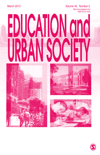
EDUCATION AND URBAN SOCIETY
Scope & Guideline
Innovating Solutions for Urban Educational Challenges
Introduction
Aims and Scopes
- Urban Education Dynamics:
Explores the unique challenges and dynamics of education in urban settings, addressing issues of equity, access, and systemic barriers faced by students and educators. - Culturally Responsive Pedagogy:
Investigates teaching strategies that recognize and incorporate students' cultural backgrounds, promoting inclusivity and engagement in diverse classrooms. - Policy Analysis and Reform:
Examines educational policies impacting urban schools, including issues related to school choice, funding, and governance, aimed at improving educational equity. - Community and Family Engagement:
Focuses on the role of families and communities in supporting educational success, including partnerships that enhance student learning and well-being. - Social Justice and Equity in Education:
Addresses issues of social justice within educational contexts, advocating for practices that promote equity for marginalized and underrepresented groups. - Impact of Socioeconomic Factors:
Analyzes how socioeconomic status influences educational outcomes, with a focus on urban populations and vulnerable student groups. - Teacher Preparation and Professional Development:
Investigates the effectiveness of teacher training programs in urban settings, emphasizing the need for culturally competent educators.
Trending and Emerging
- Digital Equity and Online Learning:
With the rise of remote education due to the COVID-19 pandemic, there is a growing emphasis on digital equity, online teaching readiness, and the implications of technology on learning outcomes. - Mental Health and Well-Being in Schools:
Increasing attention is being given to the mental health of students and educators, exploring how psychosocial factors impact educational experiences and success. - Restorative Practices and Discipline Reform:
A trend towards restorative justice approaches in schools is emerging, focusing on creating inclusive environments and reducing punitive disciplinary measures. - Intersectionality in Education:
Research examining the intersections of race, gender, socioeconomic status, and other identities in educational contexts is gaining traction, highlighting the complexities of urban education. - Community-Based Educational Initiatives:
There is a growing interest in community-led educational initiatives that engage local stakeholders to address educational disparities and enhance student support. - Environmental and Sustainable Education:
Emerging themes related to sustainability in education are becoming prominent, with a focus on integrating ecological principles into urban educational practices.
Declining or Waning
- Traditional Classroom Models:
The focus on conventional classroom settings and pedagogies is decreasing as more research emphasizes innovative, flexible, and community-based approaches to education. - Standardized Testing and Assessment:
Interest in standardized testing as the primary measure of student success is diminishing, with a shift towards holistic assessments and alternative evaluation methods. - Rural Education Issues:
Research centered on rural education contexts is becoming less frequent, overshadowed by the pressing concerns of urban educational environments. - Teacher-Centric Approaches:
There is a noticeable decline in studies that focus solely on teacher-centered instructional approaches, with a growing emphasis on student agency and participatory learning. - Homogeneous Educational Practices:
The exploration of uniform educational practices across diverse urban settings is waning, as the journal increasingly highlights the need for tailored, context-specific strategies.
Similar Journals
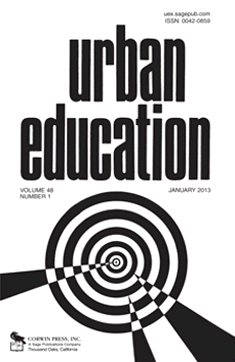
URBAN EDUCATION
Transforming Urban Learning Landscapes.URBAN EDUCATION, published by SAGE Publications Inc, stands at the forefront of the fields of education and urban studies. With a history dating back to 1965 and a converged publication reach extending to 2024, this journal plays a pivotal role in disseminating research that addresses the complexities of urban educational environments. Holding prestigious Q1 rankings in both education and urban studies categories, and boasting an impressive Scopus ranking, URBAN EDUCATION is recognized for its high impact on scholarly discourse and policy development. The journal aims to provide a platform for cutting-edge research that informs practice, enhances educational policy, and contributes to the improvement of educational outcomes in urban contexts. While it currently does not offer open access options, the rich content and critical insights produced within its pages remain invaluable to researchers, professionals, and students committed to addressing the myriad challenges in urban education.

Journal for Multicultural Education
Celebrating diversity in learning and teaching.Welcome to the Journal for Multicultural Education, an esteemed publication by Emerald Group Publishing Ltd, dedicated to advancing knowledge and practice in the dynamic fields of Cultural Studies, Education, and Linguistics. Since its inception in 2014, this journal has established itself as a leading forum for research, reflection, and discourse, addressing the multifaceted experiences of diverse cultures in educational contexts. With a commendable Scopus Rank placing it in the 87th percentile for Cultural Studies, the journal is positioned in the Q1 quartile, making it a premier outlet for scholars and practitioners looking to contribute to and engage with cutting-edge research. Our commitment to fostering an inclusive dialogue on multicultural education equips our readers with innovative strategies and insights essential for navigating today’s globalized society. While the journal operates under standard access provisions, we invite researchers, educators, and students alike to explore the rich tapestry of scholarly works published within these pages, and partake in a vibrant community dedicated to transformative education.
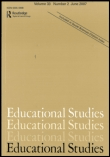
EDUCATIONAL STUDIES
Empowering Scholars Through Critical Insights in EducationEDUCATIONAL STUDIES, published by Routledge Journals, Taylor & Francis Ltd, is a leading journal in the field of education, with a significant impact factor reflecting its contribution to scholarly research. Established in 1975 and set to continue through 2024, this journal provides a platform for high-quality, peer-reviewed articles that explore diverse aspects of education theory, policy, and practice. Based in the United Kingdom, it holds a commendable Q2 ranking in Education and ranks #232 out of 1543 in the Scopus Social Sciences - Education category, positioning it in the 84th percentile. Although currently not open access, its content is available through institutional subscriptions, ensuring the dissemination of innovative research to a global audience. With a commitment to advancing educational discourse, EDUCATIONAL STUDIES is essential reading for researchers, professionals, and students aiming to engage with contemporary issues in education.
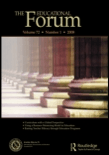
EDUCATIONAL FORUM
Pioneering Research for a New Era of EducationEDUCATIONAL FORUM, published by Routledge Journals, Taylor & Francis Ltd, is a premier academic journal that serves as a vital platform for innovative research and discourse in the field of education. With an ISSN of 0013-1725 and an E-ISSN of 1938-8098, this journal has been at the forefront of educational scholarship since its inception in 1936, continuing to disseminate critical insights through 2024. Recognized in the Q2 category of education in 2023, it holds a Scopus rank of 768 out of 1543 in the social sciences, placing it in the 50th percentile overall. Though it does not offer open access, the journal provides an essential resource for researchers, professionals, and students aiming to expand their understanding of current educational practices, policies, and innovations. By fostering an academic environment rich in rigorous analysis and thoughtful discussion, EDUCATIONAL FORUM plays an indispensable role in shaping the future of education.

Cultural Studies of Science Education
Advancing Interdisciplinary Insights in Science LearningCultural Studies of Science Education, published by Springer, is a leading journal in the field of cultural studies, with a specific focus on the intersection of science education and cultural analysis. With an ISSN of 1871-1502 and an E-ISSN of 1871-1510, this journal has demonstrated its commitment to high-quality research, evidenced by its impressive Q1 ranking in 2023 within the Cultural Studies category and a notable position in the 93rd percentile in Scopus Ranks for Social Sciences. Covering a wide array of interdisciplinary topics, the journal seeks to advance the understanding of how scientific knowledge and education are shaped by cultural contexts, making it a vital resource for researchers, educators, and policy makers. Operating from the Netherlands, the journal embraces an open access philosophy to ensure that cutting-edge research is accessible to all, fostering collaboration and innovation in the field. As we converge years from 2006 to 2024, Cultural Studies of Science Education continues to explore critical issues and innovative methodologies, aiming to inspire and inform the next generation of scholars and practitioners.
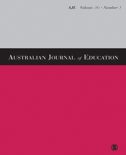
AUSTRALIAN JOURNAL OF EDUCATION
Illuminating Diverse Perspectives in Educational IssuesThe Australian Journal of Education, published by SAGE Publications Ltd, is a renowned platform dedicated to advancing scholarly discourse in the field of education. With an ISSN of 0004-9441 and an E-ISSN of 2050-5884, this journal is widely recognized for its rigorous peer-reviewed articles that contribute to theoretical and practical advancements in educational research. As of 2023, it holds a commendable Q2 quartile ranking in the field of Education, reflecting its significant impact within the academic community, with a Scopus rank of #491 out of 1543 in the Social Sciences - Education category, placing it in the 68th percentile. The journal seeks to explore diverse educational issues ranging from policy analysis to pedagogical innovations, making it an invaluable resource for researchers, professionals, and students alike who are committed to enhancing educational practices and outcomes. With issues published regularly from 1992 to 2024, the Australian Journal of Education remains a cornerstone for those engaged in critical discussions surrounding educational theory and applications.

International Journal of Multicultural Education
Championing diversity in educational research and practice.The International Journal of Multicultural Education (IJME), published by EASTERN COLL, DEPT EDUCATION, is a leading open-access journal dedicated to advancing the field of multicultural education. Established in 2007, this journal has become an essential platform for researchers, educators, and policymakers interested in exploring the complexities of education in diverse cultural contexts. With an impressive impact factor and strong rankings in multiple categories including Q1 in Anthropology and Cultural Studies, and Q2 in both Education and Social Sciences, the IJME provides high-quality, peer-reviewed articles that contribute to impactful educational practices and scholarship. The journal's open access model ensures that its invaluable research reaches a global audience, fostering dialogue and collaboration among academics, practitioners, and students. By focusing on themes that address social justice, equity, and cultural awareness in education, the IJME plays a critical role in shaping inclusive and effective educational frameworks for the future.

Education Policy Analysis Archives
Exploring Solutions for Today's Educational Challenges.Education Policy Analysis Archives is a leading academic journal published by the Mary Lou Fulton Teachers College at Arizona State University. Established in 1993 as an open-access platform, it has consistently provided a critical forum for the dissemination of empirical research, theoretical discussions, and practical insights in the field of education policy. Covering a broad range of topics relevant to education stakeholders, the journal serves as an essential resource for researchers, policymakers, and practitioners seeking to enhance educational outcomes through rigorous analysis. As a valuable contributor to the field, this journal has maintained a Category Quartile of Q3 in Education, positioning itself as a relevant but developing source of knowledge with an HIndex indicating a solid citation impact. Notably, the journal's accessibility effectively democratizes educational research, allowing wider audiences to engage with and apply its findings. With publication converging from 1996 to 2024, Education Policy Analysis Archives continues to be a significant player in shaping dialogue and research in education policy.
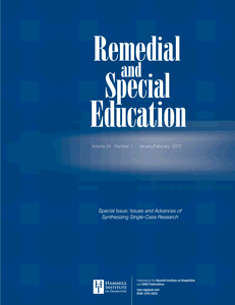
REMEDIAL AND SPECIAL EDUCATION
Connecting Research to Practice for Lasting ImpactREMEDIAL AND SPECIAL EDUCATION is a premier journal published by SAGE Publications Inc, dedicated to advancing the fields of education and public health. With an impressive legacy that spans from 1984 to 2024, this bi-monthly journal plays a pivotal role in disseminating cutting-edge research and innovative practices to support individuals with special educational needs. Ranked in the top quartile (Q1) for both Education and Public Health disciplines, and positioned in the 86th and 77th percentiles of their respective Scopus categories, this journal ensures a high visibility and significant impact rate among academics and practitioners alike. Though not open access, it offers subscription-based access, enabling a broad audience to engage with crucial findings and discussions. The journal's commitment to improving educational and health outcomes underscores its importance as a trusted source of knowledge, making it an essential read for researchers, educators, and policy-makers focused on special education and remedial strategies.

EDUCATIONAL LEADERSHIP
Transforming Educational Practices for Tomorrow's LeadersEDUCATIONAL LEADERSHIP, published by the Association for Supervision and Curriculum Development, is a pivotal journal in the field of education, focusing on innovative practices and theories that shape educational leadership today. Established in 1976, this journal addresses critical issues surrounding curriculum development, supervision, and effective leadership strategies within educational institutions. Although it currently does not offer open access, it remains an essential resource for researchers, educators, and administrators seeking to enhance their understanding of educational dynamics and improve school effectiveness. The journal's impact is underscored by its Scopus ranking, placing it 1017 out of 1319 in the Social Sciences Education category. The absence of a current HIndex in the data indicates an opportunity for further citation engagement and scholarly recognition. Additionally, while coverage in Scopus has been discontinued as of 2019, the legacy of EDUCATIONAL LEADERSHIP continues to influence educational practices worldwide, making it an invaluable asset for those dedicated to advancing the field of education.